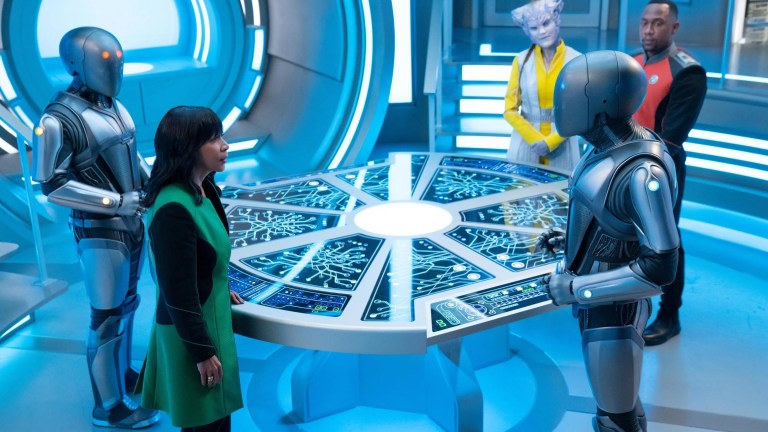The Orville: New Horizons Season 3 Episode 7 Review – From Unknown Graves
For the second episode in a row, The Orville: New Horizons prioritizes substance over spectacle in a touching and intimate episode about love, acceptance, and forgiveness.

This review of The Orville: New Horizons contains spoilers.
The Orville: New Horizons Season 3 Episode 7
Creator and showrunner Seth MacFarlane is seizing every opportunity with the third season of The Orville. This Hulu streaming renaissance has already proved itself to be the show’s most mature, poignant, and character-driven season to date.
One needs to look no further than the title of this episode to see one of its central messages. “From Unknown Graves” is a line from “The Witnesses,” a poem written in the 19th century by Henry Wadworth Longfellow which outlines the crimes committed in America against slaves.
The central story (as there are many threads within this episode) opens on a gray-alien suburban street. There are two children who are excited when they spot their father’s car pulling into the driveway, asking if he finally brought some coveted gift home to them. The father pushes a large crate in through the front door and asks the kids to step back so he can open it. The contents of the crate are revealed to be a dormant Kaylon.
Throughout the episode, writer David A. Goodman unveils a series of these vignettes where the family and the Kaylon (Graham Hamilton), referred to as K1, interact. Each interlude we see the family become more and more horrible to the (then) peaceful Kaylon, at first simply being rude to the indentured, laboring artificial intelligence, and eventually, abusing him. These specific anecdotes paint a more complete picture of the history of the Kaylon, and the “Builders,” the biological species that created the Kaylon, who fans of The Orville know will eventually be wiped out by their creation. The flashbacks add context to the discovery of a peaceful and fully emotional Kaylon named Timmis (Christopher Larkin).
While Commander Grayson (Adrianne Palicki) and Lieutenant Keyali (Jessica Szohr) are on the ship trying to convince a matriarchal species to join the Union, Captain Mercer (MacFarlane), Bortus (Peter Macon), Malloy (Scott Grimes), and Burke (Anne Winters) fly down to the surface of Citula 4, an allegedly abandoned planet, or so the crew thinks.
There, they discover Timmis, and immediately raise their weapons. But they’re greeted by a friendly and more human-sounding artificial being, with not a touch of hostility. Naturally, the Orville crew don’t trust Timmis, but he is soon joined by Doctor Villka (Eliza Taylor), who explains that she and her father, both renown cyberneticists, found Timmis after a battle with the Union. They decided to revive the barely functioning Kaylon, and in modifying his pain receptors, were able to infuse him with a full spectrum of emotions.
The episode’s script is arguably one of the most dense stories in the show’s 33 episodes so far. There is a lot going on, including the crew’s ruse to make the matriarchal Cissians believe the Union also treats males like second-class citizens, a subplot that points back to the incompatible sex life and relationship troubles of Lamaar (J Lee) and Keyali, and Burke’s continued mistrust of the Kaylons. Meanwhile, the central plot about the history of the Kaylon and Timmis’ evolution culminates with Isaac (Mark Jackson) having to make a life-altering decision in regards to whether or not he will have the procedure that will give him that same full spectrum of emotions, and what it may mean to Doctor Finn (Penny Johnson Jerald).
While hesitant at first, Isaac does in fact go through with the procedure, which leads to one of the sweetest moments in the show. Mark Jackson does not receive enough praise for his performance as Isaac. Having to portray a character devoid of emotion while still making him relatable is quite a feat. Granted, it is a Star Trek staple of sorts, as most iterations of that franchise have included a Spock or a Data-like-character within the crew to explore the intricacies of human behavior, and Isaac is clearly inspired by those classic characters. But Jackson has also had to convey this affability while completely faceless. The costume for Isaac only gives the actor the ability to convey subtlety through his voice (which often doesn’t modulate) or his body language, and still, the friendly Kaylon is a fan-favorite.
As the emotional levee breaks, Jackson gives a tremendous performance. The outbreak of real emotion begins with just a subtle smile from Jackson, which pulls viewers in, and as more emotions come flooding out, it all seems completely believable in terms of what Isaac could have had bottled up inside of him all along. The relationship between Isaac and Claire has been building for two seasons now and audiences finally get to see both of them happy and confess their love for each other.
Yet, we should have recognized a continuing thread throughout this season. In yet another heartbreaking moment, no sooner had Isaac confessed his love when he lost the emotional connection. Doctor Villka, Timmis, and Lamaar surmise that it is because Timmis was of the original generation of Kaylon, created by the Builders, and Isaac was of a later generation created by fellow Kaylon, and so their artificial brain chemistry is different. They could make the fix more permanent, but only at the cost of Isaac’s entire memory. You could easily question the convenient science, but whatever the reason, it makes such a heartfelt scene between Isaac and Claire suddenly agonizing. Granted, the important thing is they got that brief moment, even if it was all-too-brief.
This heart-wrenching emotional journey is nothing new to the beloved space explorers. In the last episode, “Twice in a Lifetime,” Malloy had his wife and kids ripped away from him in the name of temporal continuity. In that same episode, Burke confessed to Isaac that her best friend Amanda, who was killed in the battle with the Kaylon, was in fact also the woman she desperately loved. And while some fans might have been happy to see Bortus’ mate Kylden leave him, it also means their daughter, Topa, lost a father.
“From Unknown Graves” continues this thread, not only with Claire and Isaac’s loss but the incompatibility of Talla and John despite their feelings for one another. Almost the entire crew this season has lost someone close to them, possibly a subtextual comment about the politically dichotomous world we live in today and the relationships we can’t reconcile, or perhaps in reference to those whom we have lost to the pandemic.
This loaded script at times does a disservice to the overall episode. John and Talla’s relationship, even while not entirely the focus of this specific episode, felt unbelievably rushed. In three episodes, they had one five-minute flirtation, a make out session, and by the third episode, they’re talking about how much they love one another. Since so many are fans of both these characters, it would have been nice to explore the relationship a bit more, and here’s hoping that this story thread is not actually finished.
MacFarlane’s direction, however, showed a reserved maturity. He got some tremendously impactful performances out of almost the entire cast. That certainly speaks to the respect and trust between MacFarlane and his cast mates. A character-driven episode can also appear very stoic in terms of how the director utilizes the camera, but one notable aspect of this episode is how often MacFarlane used a point-of-view perspective. This puts the audience in the shoes of the characters in a few key instances, which in turn helps us empathize with the situation.
It’s no coincidence: the principle moral of the episode is clearly about empathy. Isaac shows sorrow for the incidental coldness he has shown Claire and her sons, Burke can finally relate to the Kaylon and Isaac a little more after hearing Timmis tell the story of their servitude and abuse, and the political subplot of finding common ground with those who have completely different ideals than we might — all of these threads support that theme. “From Unknown Graves” is a compelling episode which contains critical lessons that we should all listen to and live by.
